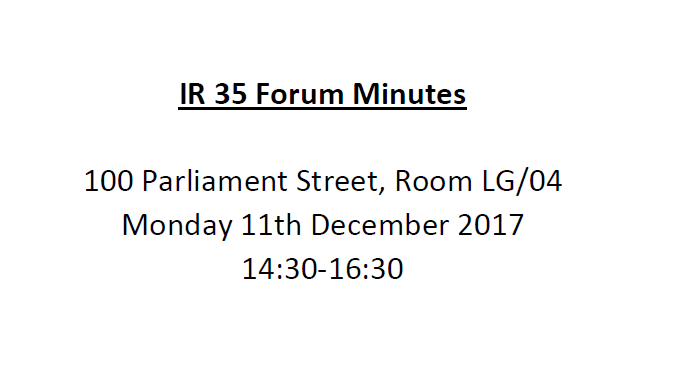The IR35 reforms that have plagued the public sector look likely to hit the private sector as early as April 2019, according to the latest IR35 Forum minutes from 11 December 2017.
Despite acknowledging that the changes have in some cases fuelled non-compliance in the public sector, HMRC has made it clear that addressing what it refers to as ‘an immediate Exchequer risk' is its main priority.
- ‘Exchequer risk’ means HMRC plans to fast-track proposed changes
- HMRC acknowledges employment rights issues, but won’t address them urgently
- Taxman concedes that reforms have stoked public sector non-compliance
- HMRC claims CEST tool assumes MOO exists – is yet to explain why
HMRC also announced that it would publish a discussion paper in response to recommendations made in Matthew Taylor’s review of modern working practices, including aligning employment taxes with employment rights. However, curiously the taxman doesn’t see fit to address this issue in conjunction with IR35.
“It’s farcical. HMRC has published a document, within which it identifies numerous problems with IR35 in the public sector, from non-compliance to flaws with CEST, in addition to inequity in the broader employment status landscape,” comments ContractorCalculator CEO Dave Chaplin. “Yet it seems willing to overlook these issues in a bid to push more money into Government coffers.”
HMRC dismisses forum concerns – set to press on with IR35
With the public sector reforms less than a year old, forum members stressed concern with HMRC that any assessment of their effectiveness would be premature. Members also agreed that employment status issues addressed in the Taylor Review and IR35 should be considered holistically.
On both occasions the taxman emphasised its perceived tax shortfall, on one occasion stating: “the Government needs to deal with an immediate and growing Exchequer risk.”
This is despite the taxman’s acknowledgment that the public sector rules have resulted in a proliferation of tax avoidance schemes, many involving umbrella companies. HMRC indicated that it would work with forum members to help tackle this behaviour.
Taxman denies false employment effect, concedes CEST shortcomings
But whilst non-compliance was discussed, the taxman was dismissive of any cases of false employment linking back to the reforms. HMRC added that it would welcome evidence of the issue, which has been highlighted on numerous occasions in the mainstream press.
“We’ve seen major organisations impose blanket rules in a bid to avoid their compliance requirements, from Transport for London to the NHS, resulting in mass false employment,” notes Chaplin. “But apparently this has all gone over HMRC’s head.”
When public sector bodies are assessing the status of contractors, many are using a flawed means of testing in HMRC’s Check Employment Status for Tax (CEST) tool. This has been known for a while, but was only acknowledged for the first time by HMRC in its forum minutes.
HMRC noted that: “CEST does not explicitly look at MOO”, one of the key tests of employment necessary to determine IR35. Instead it stated: “it is assumed that a person using CEST will have already established MOO.”
Addressing challenges to the legitimacy of CEST, HMRC announced that it would publish a considered response in January 2018. This response, which will presumably clarify the taxman’s interpretation of the law, is yet to be released.
IR35 - what the future holds and how to prepare
With HMRC’s impending consultation looking like nothing other than a formality, the taxman’s timeframe for implementing the rules in the private sector appears to be settled:
- IR35 consultation to be launched before or during 13 March Spring Budget
- Consultation to conclude late Summer/early Autumn
- Announcement of proposed private sector changes in November Autumn Budget
- Legislation to go live in April 2019
Private sector contractors and firms need to hope for the best, but prepare for the worst. The key problem with the IR35 reforms is the unwillingness of clients to evaluate the status of contractors, due to the perceived compliance burden and tax liability risk.
HMRC’s CEST tool is an inadequate solution, but there are alternative means by which contractors can secure fair and accurate assessments, swiftly and conveniently.
IR35 Shield is a free-to-use case law-backed online test which takes 15 minutes to complete. Contractors can spare their client’s the trouble by assessing their own status at IR35 Shield, whilst accountants can present this solution as an added-value service to their contractor clients using IR35 Shield. Also check out the complete process for IR35.
How you can help prevent crippling IR35 changes
“HMRC might be treating its consultation as a mere formality, but there is still an opportunity to achieve change,” says Chaplin. “There are possible changes to the reforms that can benefit both HMRC and contractors, which we need to press Government into considering.
“In order to achieve anything near parity, the burden for the Employers’ National Insurance at least needs to be shifted onto the hirer. Asking the deemed employee to pay this is outrageous. It’s like introducing legislation that makes all employees pick up their employer’s tax bill.”
The contract sector has little time to achieve change which is essential for the future of flexible working in the UK. It can be done, but it requires the full backing of its members.
To keep up-to-date with ContractorCalculator’s campaigning efforts, please follow or connect with our CEO Dave Chaplin on LinkedIn. Dave posts regularly about the IR35 reforms and is an active promoter of campaigns aimed to prevent them.

